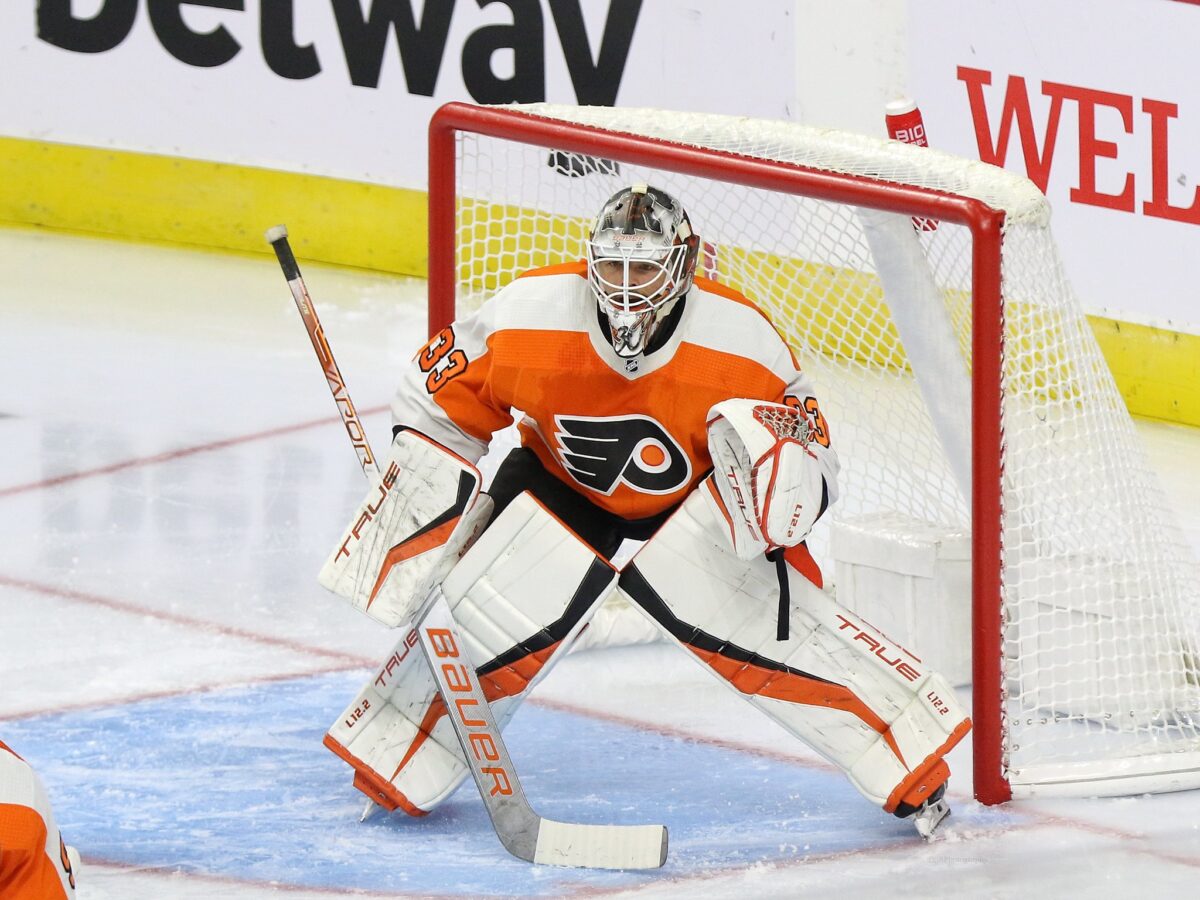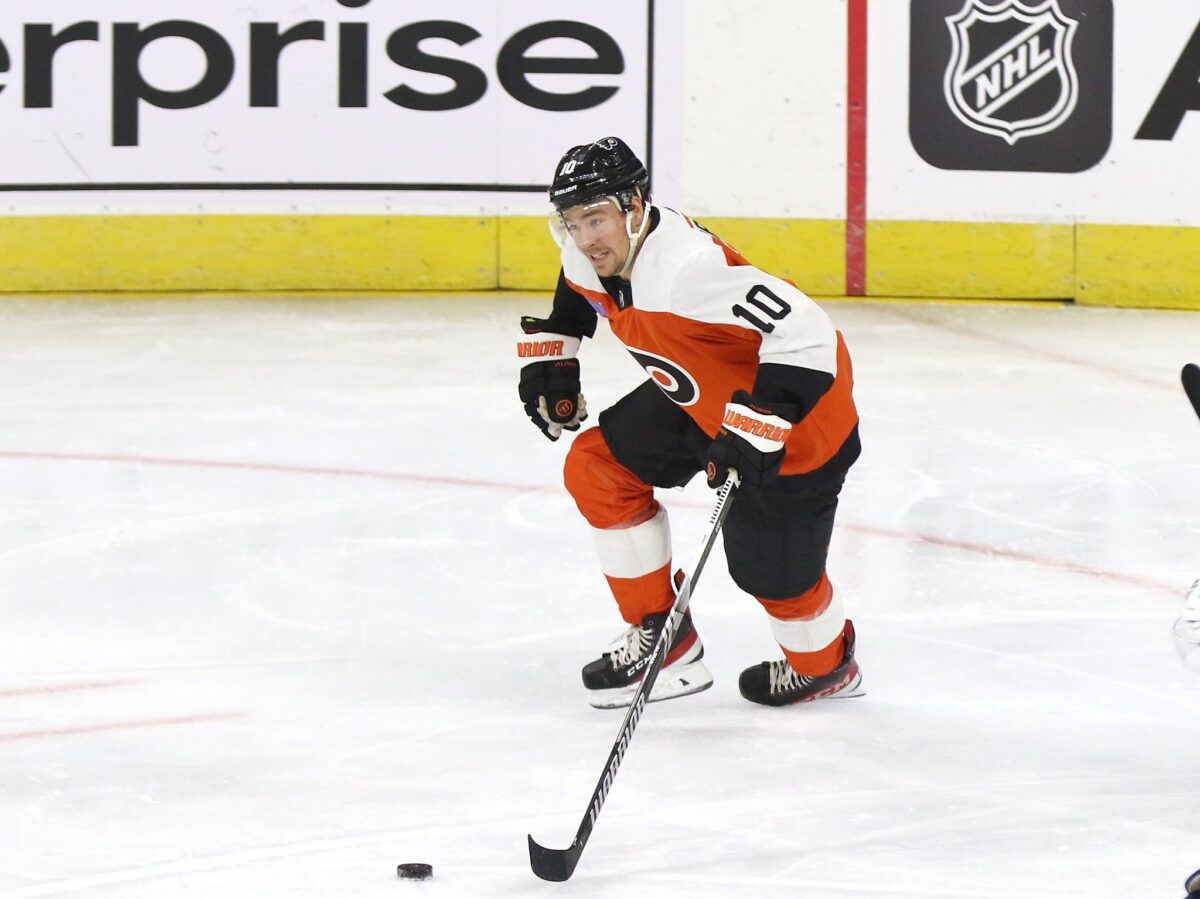The Philadelphia Flyers extended their point streak to seven games following a 4-3 win over the Washington Capitals in a shootout on Dec. 14. The Flyers are now 16-10-3 on the season, tied for second place in the Metropolitan Division and just five points behind the best record in the Eastern Conference. What were some takeaways from the Flyers’ important victory?
Flyers Could Have Played Better
Even though the Flyers beat a Washington team that has one of the best records in the NHL and did so with starting goaltender Carter Hart being absent on very short notice, they could have played better. Through most of regulation, the Capitals were the better team. It’s huge to get a win against a division rival, but it wasn’t their best showing.
The Flyers can be happy at the end of the day with their two points, but they weren’t earned through a fantastic performance like they usually are for Philadelphia. Despite the Capitals being a fairly poor team at 5-on-5 — holding an expected goals percentage (xG%) of just under 47 percent — they outplayed the Flyers in most situations, including when both teams had five skaters up until the latter stages of the third period.
The issue for Philadelphia was their transition game, as the Capitals did a great job of clogging the neutral zone and not allowing the Flyers to beat them in that way. By the time the late stages of the third period rolled around, that’s where the Orange and Black found their game and played at their best, skewing the numbers in their favor. This was no typical Flyers game, and their high-quality chances were down in this one. The Capitals deserve some credit for how well they played defensively, but that doesn’t excuse an underwhelming performance from Philadephia.
By absolutely no means were the Flyers awful in this contest, but they have played better than what they did here on numerous occasions. The end of the third period was a huge turnaround for the Flyers, as that marked some of their first sustained and truly dangerous pressure of the entire game. Without that short stint, the Flyers are probably losers in this one.
Ersson Bounced Back
Filling in for Hart was goaltender Sam Ersson, and he did so after a recent performance against the Nashville Predators on Dec. 12 that saw him have a lowly .864 save percentage (SV%) in a 3-2 overtime loss. Needing a solid match in goal, he delivered — though he rocked a subpar .900 SV%. The quality of his saves was much higher than the quantity, making this an adequate bounce-back game for him.

It’s easy for a young backup goaltender to get flustered, but that has never been the case with Ersson. He was hung out to dry a bit on some of the goals that were scored on him, but he still came up clutch often enough to earn the win.
The Flyers put a lot of faith into their goaltenders when considering their defensive structure, as they are one of the best defensive teams in the league but oftentimes allow high-quality chances. An elite goaltender like Hart is ordinarily supposed to find more success in making those kinds of saves, but Ersson has done the exact same. Breakaways have not been a problem for him recently.
Related: Philadelphia Flyers’ Rebuild Hinges on Carter Hart Trade Decision
Ersson won’t get the net too frequently, and only did in this game because of Hart’s unexpected illness. The importance of him having a bounce-back game trumps that of any other player on the team. He needs to be at his best at all times, as his opportunities are the fewest.
Brink Had One of His Best Games
In his rookie campaign, 22-year-old Bobby Brink has been hard to miss on the ice. He has been a treat to watch with the puck on his stick, and furthered that narrative in this game. Not only did he get the all-important first goal, but he got the last one in the shootout as well. With 14 points in 24 games this season, Brink has obviously had some impressive games. For his importance here, this one might have been his best.

Brink did a lot of things well in this game that he is always doing, but it was just a bit more noticeable against the Capitals. He’s always speedy with the puck and generating chances here and there, but to have him capitalize on them makes all the difference. On just the first shootout attempt of his career, he scored to give the Flyers a lead in the final round. His level of poise and calmness in an intense moment is a reason to love him as a player.
Flyers Continue to Fight
There are few teams as dominant when they start with the lead quite like the Flyers are, having held a 13-1-0 record entering this game when they come across it. Even though they got what is consistently the most important goal for them, they trailed on multiple occasions in this one.
Regardless of the Flyers’ general inability to create offense, they found a way to stay in the game. They rallied back from both 2-1 and 3-2 deficits in the third period. With how little they challenged opposing goaltender Charlie Lindgren, they were entering miracle territory to have a chance. Late in the third period, Owen Tippett altered their fate with a long-range goal through a screen.
After Tippett’s goal, the Flyers had their late jolt. They are normally on the other side of the pressure in tied games late in the third period, but the shoe was on the other foot this time around. The refusal to quit changed the momentum of this game entirely, helping get the Orange and Black two inter-division points that they desperately needed.
The Flyers have another top team in the Eastern Conference next up on their schedule in the 15-10-4 Detroit Red Wings at Wells Fargo Center on Dec. 16. They will be without star centerman Dylan Larkin following a controversial injury sustained last week, and that’s a devastating blow for them. Nonetheless, the Flyers should be looking forward to that game.